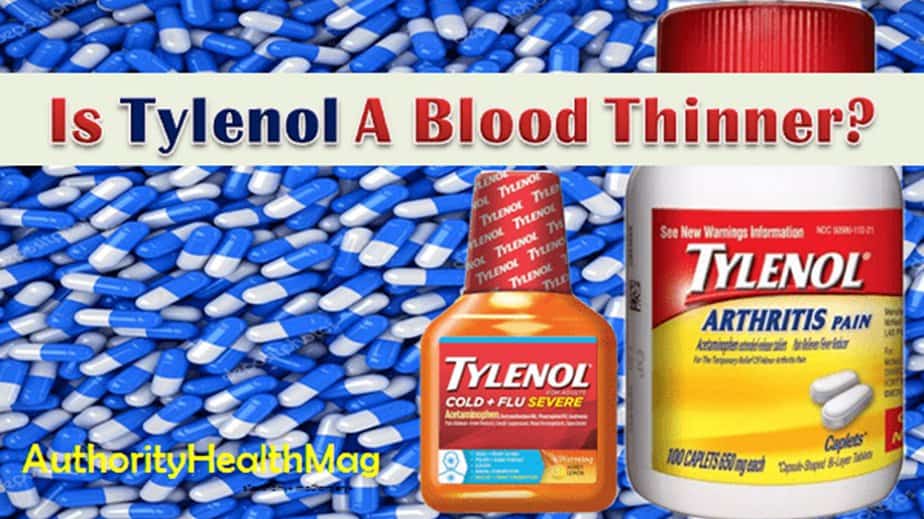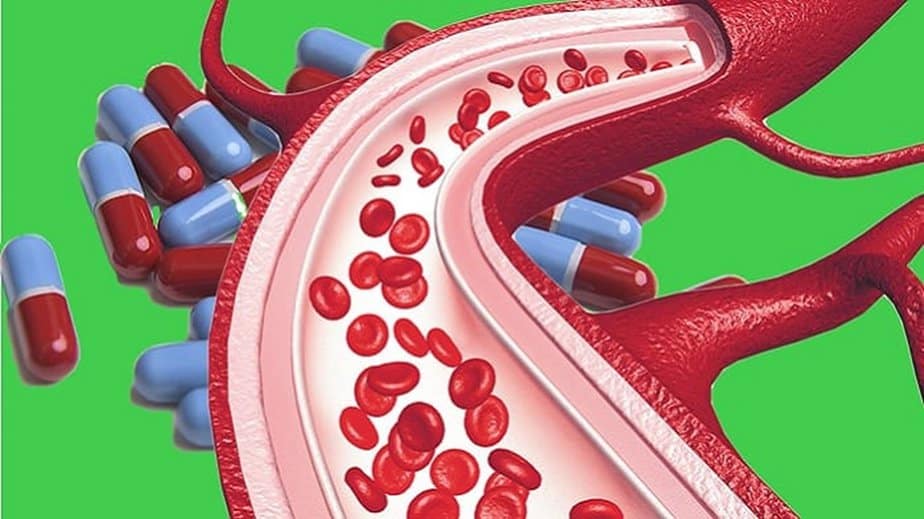Many are concerned about whether or not Acetaminophen (sold under the brand name “Tylenol”) possesses anticoagulant effects.
Tylenol, like nonsteroidal anti-inflammatory drugs (NSAIDs), is an over-the-counter medicine to reduce pain, fever, flu, or cold. It blocks pain by inhibiting the synthesis of prostaglandin.
Acetaminophen is known as a non-aspirin pain reliever. It is not an NSAID, as it does not relieve inflammation.
Acetaminophen-based drugs are not blood thinners. However, some patients might experience a blood-thinning effect, especially when it is used along with other prescription medicines or NSAIDs.
NSAIDs affect how platelets function and can sometimes interfere with normal blood clotting.
Prescription medicines used as blood thinners help blood flow smoothly through arteries and veins.
Blood thinners save lives by stopping thick blood clots from forming in the arteries, which can lead to a heart attack.
The most commonly used blood thinners are anticoagulants such as Warfarin, heparin, or coumadin. They produce chemical reactions in the body to delay the clotting of blood.
Depending on the dosage, antiplatelet drugs like aspirin or ibuprofen can prevent the platelets in the blood from clumping together to form a clot.
This article focuses on the question: “Does Tylenol thin your blood?”
Tylenol is a popularly used prescription or over-the-counter medication for pain relief, and also helps reduce fever.
It works well for common health issues like headaches, muscle pain, back pain, arthritis, toothache, fever, and the common cold. It’s a proven drug for aches and pain management.
This OTC pain reliever does not cause stomach problems like other pain relievers or anti-inflammatory medicines. It is safe even for children and pregnant women.
Acetaminophen is a highly recommended medicine for arthritis pain relief, as it has fewer side effects than NSAIDs like Aspirin, Aleve, Ibuprofen, Advil, or Motrin.
OTC brands of Acetaminophen such as Tylenol, Paracetamol, and Panadol are the largest used painkiller pills in the world. It relieves both pain and fever.
This medicine was first introduced in 1955 by McNeil Consumer Healthcare, a Johnson & Johnson subsidiary, as a prescription drug for children under the name Tylenol Elixir.
In 1959, the FDA approved the OTC sale of Elixir, followed by the introduction of the adult version of it.
McNeil coined the name “Tylenol” from the drug’s chemical name and the generic “acetaminophen.”
Currently, it’s available in different formulations for treating specific illnesses under different categories like arthritis pain, cold and flu, allergy, cough, sinus, extended relief, etc.
You can also find several of its substitute brands with the same formulation.
Some alternative brands are Mapap, Tempra, Acephen, Feverall, Ofirmev, Nortemp, Mejoralito, Xl-Dol, Aphen, Ringl, Bf-Paradox, Eliquis, Excedrin, Aypanal, Apap, and Panadol.
Ingredients in Tylenol
The active ingredient in Tylenol is Acetaminophen or paracetamol.
Tylenol is coined from the chemical name for the compound, N-aceTYL-para-aminophENOL (APAP).
The compound formula of Tylenol is C8H9NO2.
There are several formulations of Acetaminophen for treating pain, fever, and inflammation.
Tylenol PM contains diphenhydramine, which can help you sleep by causing drowsiness.
Some of the popular formations are Midol, Dristan, and Ultracet.
Since there are many formulations of Acetaminophen, chances of mismatch and accidental overdose are likely.
Is Tylenol A Blood Thinner

In health forums and blogs, you often come across the question, “Is Tylenol a blood thinner?”
No, Tylenol or Acetaminophen is not classified into blood thinner groups of drugs. It does not have blood-thinning properties. It’s just a pain medication.
Tylenol does not thin the blood; still, it may cross-interact with other blood-thinning factors to form complex substances. This may affect the functioning of tissues, including blood.
Most pain relievers contain blood thinning agents that may slightly increase the risk of bleeding.
It is important to disclose to your dentist and physician the various drugs you are consuming to avoid the risk of excessive bleeding after a tooth extraction or an operation.
Tylenol does thin your blood to some extent under certain conditions.
Some physicians think Acetaminophen’s analgesic properties may produce a mild blood-thinning effect. However, when compared to regular blood thinners like Warfarin, this is a negligible effect.
In some treatments, doctors may prescribe the simultaneous use of Warfarin and Tylenol, which is safe and effective most of the time.
If you take high doses of Acetaminophen over a prolonged period, caution is recommended when simultaneously taking anticoagulant pills like heparin or Warfarin.
The maximum amount of Acetaminophen an adult can take is 1,000 milligrams (mg) per dose.
If you regularly take Acetaminophen, do not start taking Warfarin without your doctor’s consent.
You should seek quick medical assistance if you experience side effects like dizziness, weakness, nosebleeds, bruising, or bleeding gums after taking Warfarin and Tylenol at the same time.
Tylenol Side Effects
Tylenol may produce side effects in some individuals due to their particular health conditions.
Some people may develop allergic reactions from this pill, which, if not treated in time, can develop into severe health issues. Its interaction with other drugs may thin the blood.
Patients already on other medications may face cross-interactions between Tylenol and those other medicines.
Acute liver failure can occur after one very large dose of Acetaminophen.
Side effects of Tylenol are usually associated with the overdosage of the pill taken by the patient.
An overdose of Acetaminophen can result in side effects such as:
- Excessive sweating
- Nausea
- Diarrhea
- Vomiting
- Weakness
- Dizziness
- Loss of appetite
- Stomach ache
- Liver damage
The patient must seek immediate medical intervention for severe symptoms or side effects.
Stop taking Tylenol if you experience any physical discomfort. Also, do not take it if you’re taking a blood thinner.
Frequently Asked Questions
Does Tylenol contain aspirin?
According to the official report of the manufacturer of Tylenol, the active ingredient contained in this medicine is Acetaminophen only.
The company also claims that Tylenol does not contain aspirin, ibuprofen, or naproxen, active ingredients in other nonprescription pain relievers.
Tylenol relieves pain differently from other nonprescription pain relievers like aspirin and ibuprofen.
How much Tylenol can you take?
The recommended dose of Tylenol for adults daily is not more than 4 g.
Not more than 90 mg of Acetaminophen per kg of body weight per day is recommended for children.
An overdose of Acetaminophen can cause serious side effects that can damage organs and imbalance body functions.
Normally, Acetaminophen is a safe and effective pain reliever. However, it should be used according to its provisions and requirements. Always follow the recommendations of your physician regarding the dosage and frequency.
Can Tylenol be used during pregnancy?
According to FDA classification protocols, Tylenol comes under the Pregnancy category, B group drugs. This implies that Acetaminophen is safe for a pregnant woman.
However, regular intake of this pill for a prolonged period is not recommended. A pregnant woman should ensure that the dosage should not exceed the prescribed limit.
Pregnant women taking other prescription medicines should not take this OTC pill without a recommendation from their doctor.
Is it safe to take ibuprofen (Advil) with acetaminophen?
Yes, it’s safe to take Acetaminophen and ibuprofen together for extra pain relief, such as for a dental extraction. Taking them together has higher effectiveness in relieving pain than taking either separately. This is safe because these painkillers work differently and have few side effects. Talk to your doctor before using them.
The Final Thought
Tylenol is not a blood thinner like anticoagulant prescription medicines. It works well as a pain reliever and fever reducer.
In rare cases, it may interact with other blood thinners and NSAIDs, forming big lumps of blood clots in the arteries and veins.
Patients taking Tylenol for a long period should exercise caution while taking anticoagulant medicines. Do not take blood thinners that prevent blood clots along with this drug.
Read next: Is Ibuprofen A Blood Thinner?
